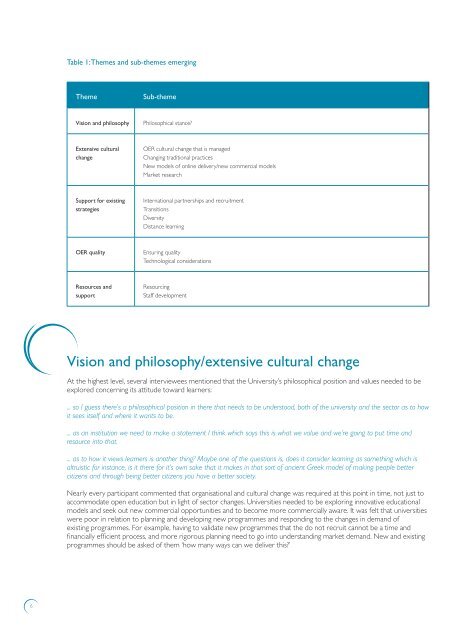How institutional culture can change to adopt open practices
How institutional culture can change to adopt open practices
How institutional culture can change to adopt open practices
Create successful ePaper yourself
Turn your PDF publications into a flip-book with our unique Google optimized e-Paper software.
Table 1: Themes and sub-themes emerging<br />
Theme<br />
Sub-theme<br />
Vision and philosophy<br />
Philosophical stance?<br />
Extensive cultural<br />
<strong>change</strong><br />
OER cultural <strong>change</strong> that is managed<br />
Changing traditional <strong>practices</strong><br />
New models of online delivery/new commercial models<br />
Market research<br />
Support for existing<br />
strategies<br />
International partnerships and recruitment<br />
Transitions<br />
Diversity<br />
Distance learning<br />
OER quality<br />
Ensuring quality<br />
Technological considerations<br />
Resources and<br />
support<br />
Resourcing<br />
Staff development<br />
Vision and philosophy/extensive cultural <strong>change</strong><br />
At the highest level, several interviewees mentioned that the University’s philosophical position and values needed <strong>to</strong> be<br />
explored concerning its attitude <strong>to</strong>ward learners:<br />
... so I guess there’s a philosophical position in there that needs <strong>to</strong> be unders<strong>to</strong>od, both of the university and the sec<strong>to</strong>r as <strong>to</strong> how<br />
it sees itself and where it wants <strong>to</strong> be.<br />
... as an institution we need <strong>to</strong> make a statement I think which says this is what we value and we’re going <strong>to</strong> put time and<br />
resource in<strong>to</strong> that.<br />
... as <strong>to</strong> how it views learners is another thing? Maybe one of the questions is, does it consider learning as something which is<br />
altruistic for instance, is it there for it’s own sake that it makes in that sort of ancient Greek model of making people better<br />
citizens and through being better citizens you have a better society.<br />
Nearly every participant commented that organisational and cultural <strong>change</strong> was required at this point in time, not just <strong>to</strong><br />
accommodate <strong>open</strong> education but in light of sec<strong>to</strong>r <strong>change</strong>s. Universities needed <strong>to</strong> be exploring innovative educational<br />
models and seek out new commercial opportunities and <strong>to</strong> become more commercially aware. It was felt that universities<br />
were poor in relation <strong>to</strong> planning and developing new programmes and responding <strong>to</strong> the <strong>change</strong>s in demand of<br />
existing programmes. For example, having <strong>to</strong> validate new programmes that the do not recruit <strong>can</strong>not be a time and<br />
financially efficient process, and more rigorous planning need <strong>to</strong> go in<strong>to</strong> understanding market demand. New and existing<br />
programmes should be asked of them ‘how many ways <strong>can</strong> we deliver this?’<br />
6

















